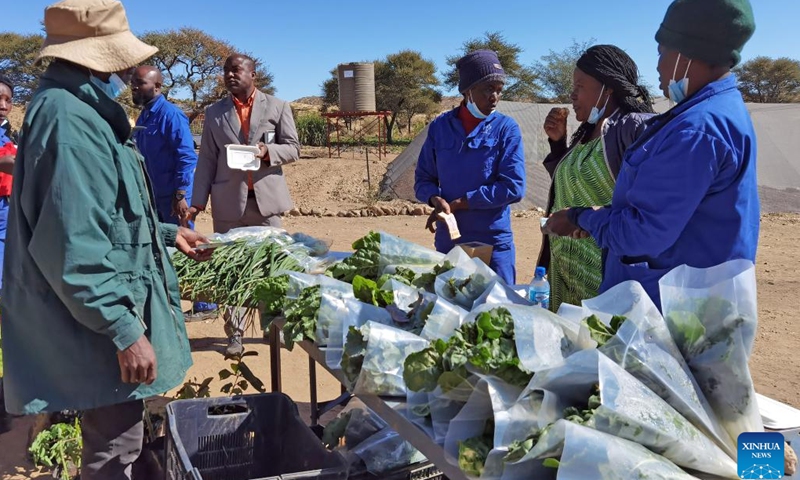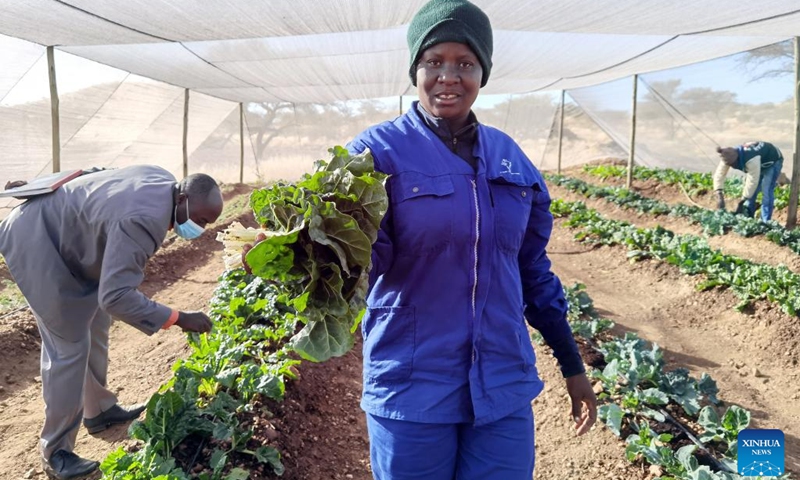
A man buys vegetables at an agricultural project in Windhoek, Namibia on June 22, 2022. A smart agricultural project in Namibia's capital city, Windhoek is empowering city dwellers to tackle hunger and enterprise sustainable futures through farming practices at Farm Okukuna.(Photo: Xinhua)

A farmer displays her plants at an agricultural project in Windhoek, Namibia on June 22, 2022. A smart agricultural project in Namibia's capital city, Windhoek is empowering city dwellers to tackle hunger and enterprise sustainable futures through farming practices at Farm Okukuna.(Photo: Xinhua)
A smart agricultural project in Namibia's capital city, Windhoek is empowering city dwellers to tackle hunger and enterprise sustainable futures through farming practices at Farm Okukuna.
Farm Okukuna which is located in the far north-west of Windhoek, on the border of the informal settlements of Goreangab, was established by the City of Windhoek municipality and the World Future Council to improve food and nutrition security.
Allocated in 2017, the farm offers space to disadvantaged citizens and informal vendors to produce vegetables and other farm products to combat hunger and food insecurity.
On a recent visit to the project, Sandra Kayama from Windhoek was spotted toiling away, tending to spinach. She is one of the beneficiaries trained on land preparation, fertilizers, farm implements and other factors under the project.
At first, the idea of farming seemed so far-fetched for the homeless Kayama, who lived on the street until 2020 when she was taken to a temporary shelter following the COVID-19 outbreak.
But now, horticulture has become a lifeline for this young mother.
"Since joining the project in September last year, I transformed from wandering streets to becoming a farmer. I am now growing vegetables such as cabbage, beetroots and spinach. I look forward to my first harvest to address food and nutrition security," she said, as she lauded the program for aiding her personal development.
"The vegetables we produce on this plot go to the plate. It is also my contribution to feeding the nation, I am more confident in addressing the issue of food insecurity," Kayama added.
Anatolia Shipale, another beneficiary, said that she takes advantage of networks, and strategies to trade her produce, giving her a chance to generate a substantial income from yields.
"I am given a chance to change my situation. I hope to produce enough to sell and save towards securing shelter for myself and my children, and no longer be homeless," she added.
The Mayor of the City of Windhoek, Sade Gawanas, said that the Farm Okukuna project is being implemented through the 'Build Back Better' project, launched in May 2021, to support efforts toward strengthening the Namibian food systems to recover from the COVID-19 pandemic, emergencies and related shocks.
According to Gawanas, the project provides beneficiaries with land, training and facilities.
"The challenges posed by rapid urbanization also present opportunities to mitigate the risk of food security and unlock revenue generation and employment through urban agriculture projects," she said.
So far, the project has surpassed the target of 100 beneficiaries with 353 benefiting in Windhoek alone. It has also been successfully rolled out to the Erongo, Hardap and Kavango East Regions.
